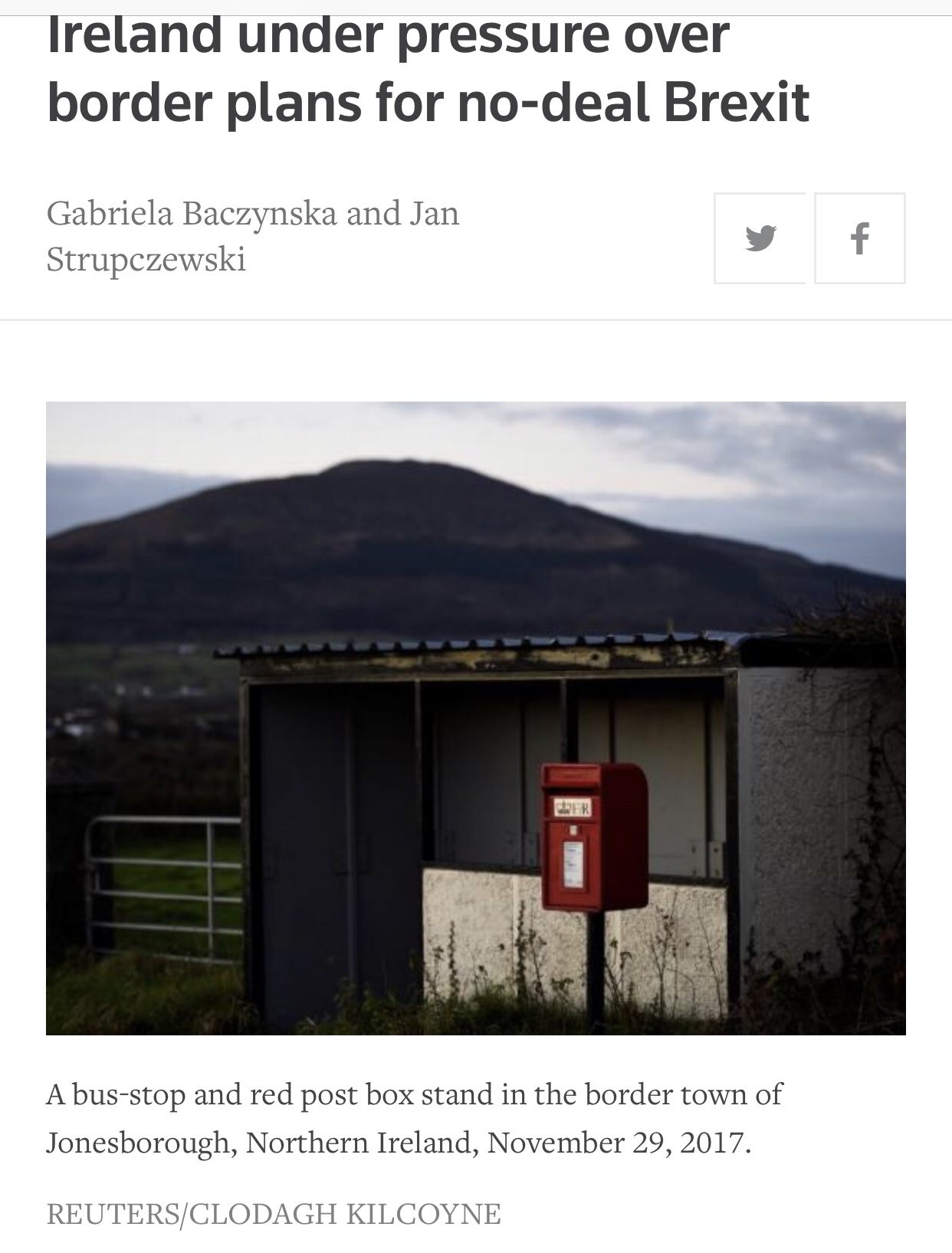The European Union will give Ireland some leeway to establish new border arrangements with Northern Ireland in case of a no-deal Brexit, sources in the bloc’s political hub Brussels said.

But they said Dublin would soon have to come up with a plan to ensure the integrity of the EU’s single market or face checks on its own goods coming into the rest of the bloc.
“Ireland can get transition periods or some temporary opt-outs on the border in the worst-case scenario,” a senior EU diplomat said.
“But soon enough it will have to face up to the fact that either there is a border on the island or a border between Ireland and the rest of the EU,” the person added.
EU diplomats and officials dealing with Brexit admit it is impossible to set up full border controls overnight as should theoretically be the case if the United Kingdom leaves the bloc without a divorce settlement on March 29.
The issue of a “hard border” on the island of Ireland has hung over Brexit negotiations from the start and is threatening to sink the divorce deal put together over months of painstaking EU-UK talks as the British parliament opposes the Irish “backstop” part of it.
The “backstop” is meant as a last resort, a way to prevent full-blown border controls on goods crossing between EU-state Ireland and the British province of Northern Ireland.
But without a UK-EU free trade deal, yet to be negotiated, that would tie the latter to the bloc’s trade rules – anathema to hardline pro-Brexit supporters in Britain and British Prime Minister Theresa May’s Northern Irish allies who say it would weaken the province’s links with the rest of the country.
Many in Britain, Ireland and the rest of the EU also fear the return of border checks could reignite violence and make checkpoints a target.
To read the entire article, click here: Ireland under pressure over border plans for no-deal Brexit
Source: Reuters
Prime Minister Theresa May has suffered a fresh defeat in a Commons vote on her Brexit strategy by 303 to 258.
Labour leader Jeremy Corbyn has called on the prime minister – who did not take part in the debate – to “admit her Brexit strategy has failed”.
Tory Brexiteer rebels abstained, saying the government’s motion implied a no-deal Brexit would be ruled out.
Ministers said that was not the case but defeat would make life more difficult for the PM in EU talks.
Mrs May has promised MPs a final, decisive vote on her Brexit deal with the EU when she has secured the changes to it she believes MPs want to see.
A Labour amendment calling for that final, meaningful vote to be held before 27 February was earlier defeated by 16 votes.
An SNP amendment, which was also backed by the Liberal Democrats, calling for Britain’s departure from the EU on 29 March to be delayed by three months, was defeated by 93 votes to 315, after most Labour MPs abstained.
Commenting on Mrs May’s latest defeat, Jeremy Corbyn said: “Two weeks ago, the prime minister told Parliament that her new approach could ‘secure a substantial and sustainable majority’ in Parliament.
“However, tonight’s vote has proved that there is no majority for the prime minister’s course of action.
“This can’t go on. The government can’t keep ignoring Parliament or ploughing on towards 29 March without a coherent plan.”
He added that the PM needed to admit her strategy had failed “and come back with a proposal that can truly command majority support in Parliament”.
Downing Street had earlier warned that a defeat in Thursday’s vote could damage the prime minister’s negotiating position, as she seeks to make changes to the controversial backstop “insurance policy” in her deal to avoid customs checks between Northern Ireland and the Republic of Ireland.
Mrs May believes she can secure a Commons majority for the deal if she can get legally-binding changes to the backstop clause – something the EU has consistently ruled out.
Labour has accused her of “running down the clock” so that MPs will be faced with a last-minute choice between her deal and no-deal.
The defeat is Mrs May’s tenth in a Commons vote since becoming PM.
Source: BBC News
Earlier todat I was interviewed about Brexit on the Norwegian national news radio NRK together with the Director of the Confederation of Norwegian Enterprise (NHO), Ole Erik Almlid.

I taöked about the unsufficient Brexot readiness in Norway and how dangerous it is for an export country with time critical products, like fish/salmon, and with invested interest in a number of critical industries involved in complicated value chains with UK business – and with Brexit a few days ahead.

The NHO Director, Ole Erik Almlid supported my views and all I said about the need for Norway trading environment to make full speed ahead regarding Brexit preparations.






You must be logged in to post a comment.